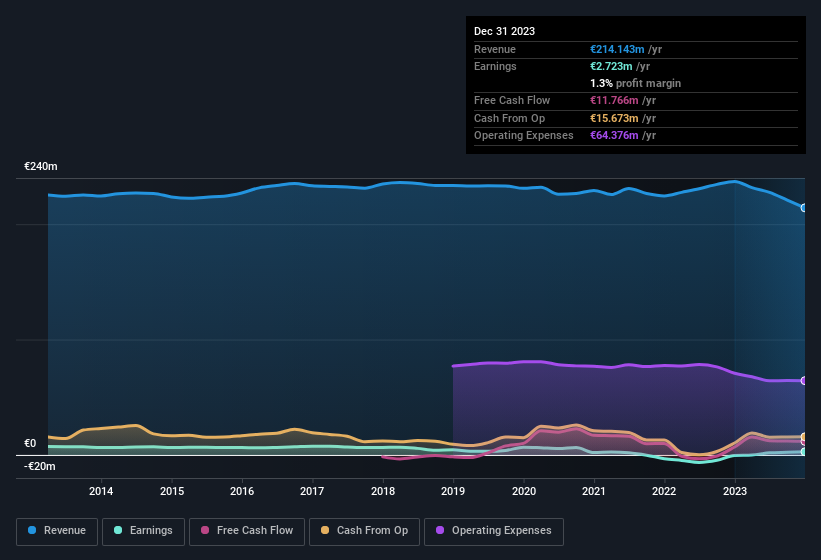Westag (FRA:WUG) Is Posting Promising Earnings But The Good News Doesn’t Stop There

Westag AG's (FRA:WUG) recent earnings report didn't offer any surprises, with the shares unchanged over the last week. We did some digging, and we think that investors are missing some encouraging factors in the underlying numbers.
View our latest analysis for Westag

Zooming In On Westag's Earnings
Many investors haven't heard of the accrual ratio from cashflow, but it is actually a useful measure of how well a company's profit is backed up by free cash flow (FCF) during a given period. The accrual ratio subtracts the FCF from the profit for a given period, and divides the result by the average operating assets of the company over that time. The ratio shows us how much a company's profit exceeds its FCF.
That means a negative accrual ratio is a good thing, because it shows that the company is bringing in more free cash flow than its profit would suggest. While it's not a problem to have a positive accrual ratio, indicating a certain level of non-cash profits, a high accrual ratio is arguably a bad thing, because it indicates paper profits are not matched by cash flow. That's because some academic studies have suggested that high accruals ratios tend to lead to lower profit or less profit growth.
For the year to December 2023, Westag had an accrual ratio of -0.20. Therefore, its statutory earnings were very significantly less than its free cashflow. To wit, it produced free cash flow of €12m during the period, dwarfing its reported profit of €2.72m. Westag shareholders are no doubt pleased that free cash flow improved over the last twelve months. However, as we will discuss below, we can see that the company's accrual ratio has been impacted by its tax situation.
Note: we always recommend investors check balance sheet strength. Click here to be taken to our balance sheet analysis of Westag.
An Unusual Tax Situation
Moving on from the accrual ratio, we note that Westag profited from a tax benefit which contributed €931k to profit. This is of course a bit out of the ordinary, given it is more common for companies to be paying tax than receiving tax benefits! We're sure the company was pleased with its tax benefit. And since it previously lost money, it may well simply indicate the realisation of past tax losses. However, our data indicates that tax benefits can temporarily boost statutory profit in the year it is booked, but subsequently profit may fall back. Assuming the tax benefit is not repeated every year, we could see its profitability drop noticeably, all else being equal.
Our Take On Westag's Profit Performance
In conclusion, Westag has strong cashflow relative to earnings, which indicates good quality earnings, but the tax benefit means its profit wasn't as sustainable as we'd like to see. Based on these factors, we think that Westag's profits are a reasonably conservative guide to its underlying profitability. If you'd like to know more about Westag as a business, it's important to be aware of any risks it's facing. For instance, we've identified 2 warning signs for Westag (1 doesn't sit too well with us) you should be familiar with.
Our examination of Westag has focussed on certain factors that can make its earnings look better than they are. But there are plenty of other ways to inform your opinion of a company. Some people consider a high return on equity to be a good sign of a quality business. So you may wish to see this free collection of companies boasting high return on equity, or this list of stocks that insiders are buying.
Valuation is complex, but we're here to simplify it.
Discover if Westag might be undervalued or overvalued with our detailed analysis, featuring fair value estimates, potential risks, dividends, insider trades, and its financial condition.
Access Free AnalysisHave feedback on this article? Concerned about the content? Get in touch with us directly. Alternatively, email editorial-team (at) simplywallst.com.
This article by Simply Wall St is general in nature. We provide commentary based on historical data and analyst forecasts only using an unbiased methodology and our articles are not intended to be financial advice. It does not constitute a recommendation to buy or sell any stock, and does not take account of your objectives, or your financial situation. We aim to bring you long-term focused analysis driven by fundamental data. Note that our analysis may not factor in the latest price-sensitive company announcements or qualitative material. Simply Wall St has no position in any stocks mentioned.
About DB:WUG
Westag
Manufactures and sells wood-based products for interior finishing and building construction primarily in Germany and internationally.
Flawless balance sheet with proven track record.
Market Insights
Community Narratives



